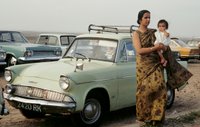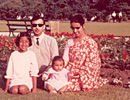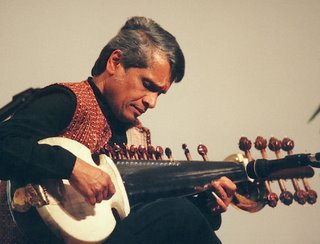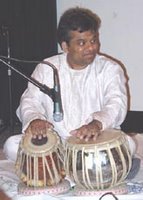
I am involved with outreach for the
Full Frame Documentary Film Festival, and tonight had the fortune of privately previewing Sandhya Suri's
I for India documentary on DVD, which will be shown here at the Festival in a few weeks. I thoroughly enjoyed her film, a story of her parents' leaving their home in India in 1965. Her father, Yash Pal Suri, had finished medical school and, part of India's "brain drain", he leaves for England with his wife Sheel and (I believe) daughter Neeraj to practice medicine in the town of Darlington.

One of the first things that Yash does to stay in touch with his family back in Meerut India is to purchase two Super 8 film cameras, two projectors, and two tape recorders. One set he sends to India and the other he uses to document their life in England; each side periodically mails their multimedia journal to the other as an extended postcard/letter.
This film presents a poignant and beautifully made film by his mid-1970s (and youngest?) born daughter, Sandhya. In it, she edits down to 70 minutes her father's 40 years of film and audio journals that chronicle the birth of two more children including Sandhya and Vanita, the pain of the separation from extended family back home, and of the immigrant experience, including excerpts from English news programs about the onslaught of "colored" immigrants.

The film had special significance to me, as my parents also immigrated from India. That said, I think that this film would appeal to anybody interested in bittersweet consequences of families moving ahead due to circumstance while being forced to leave behind some family and tradition.
The story itself is captivating, all the more so since it is made from actual historical footage. Where is home? How should the Suri family respond to urgent appeals to reunify and return to India? Is there opportunity for Yash back in India after some years of building a strong reputation for himself in England? Would the girls prefer to grow up surrounded by people who might look more like them? Does the independence and relative loneliness of English life suit Sheel better than the vibrant chaos of extended family life in India? How does Vanita's interest in settling in Australia impact the already once painfully transplanted family? Voice-over, sounds of old film and tape mechanisms running, and cuts between England and India journals all contribute to the narration. The pathos of the family's being aware of the aging of their parents and other relatives back home but their inability to be there to comfort and assist them is heartfelt in the journal archives. Perhaps the most emotive element is Sandhya's use of contemporary voice-over near the end with film footage from the family's original departure from India being shown.

Coming from a mathematics and German background (uncannily, just as I have), Sandhya built on a shorter family documentary,
Safar, to create this film, her first feature-length one.
I for India has already won her a number of awards. It is well worth seeing, beautifully made and sentimental but not at all maudlin, a documentary by nature realistically, but also poetically, presented. It's difficult to believe that this is a first feature-length effort; I anxiously await the unfolding of Sandhya Suri's hopefully long film career.
8 1/2 stars out of 10
Links of interest:
Note: all pictures are from the film site and are ©2006 by Sandhya Suri and used with her permission
















